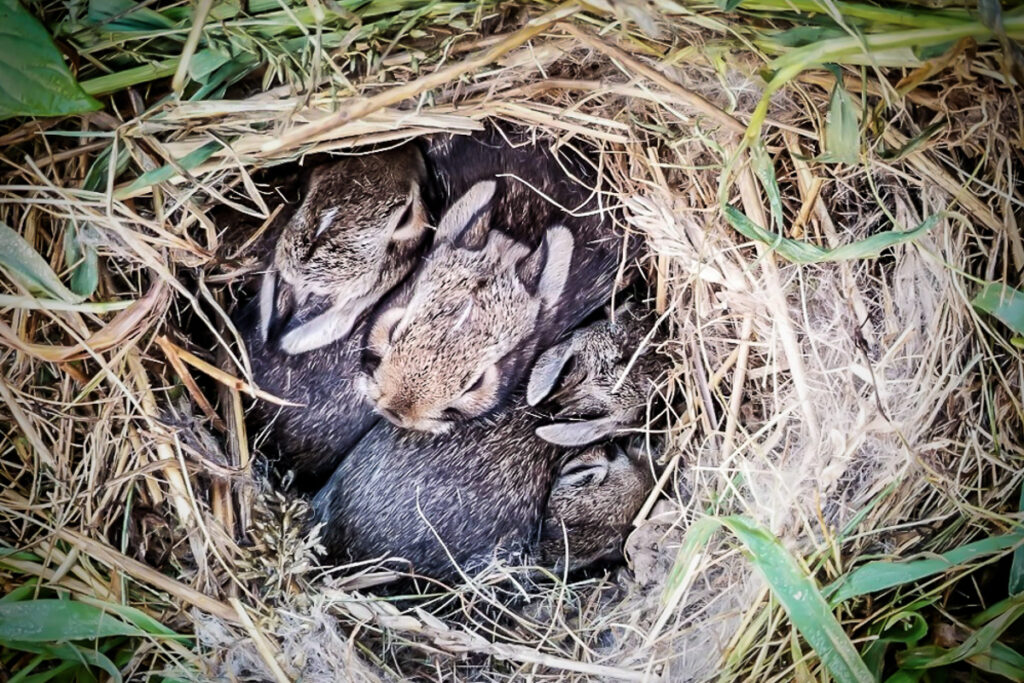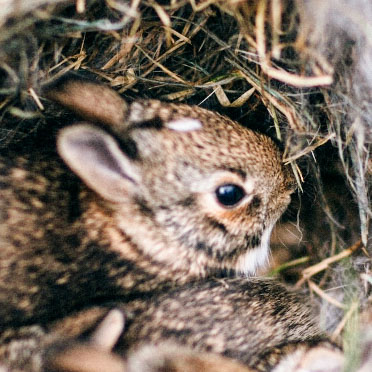MOST PEOPLE mean well when they discover an “abandoned” nest of wild rabbits. Often they wish to “rehabilitate” them with some advice from others. The reality is fewer than 10% of orphaned rabbits survive a week, and the care that people attempt to provide can be illegal, unnecessary, and potentially harmful.
Most of the time, wild rabbits do NOT NEED any help and are hopping around, learning, and waiting for mom to return. Please put them back for her if they appear healthy.
I/My Dog/My Cat Found a Rabbit Nest! What Do I Do?
Rabbits hide their nests in plain view, often putting them in the open; for example, in the middle of the lawn, in brush piles and long grass. If you find a nest that has been disturbed, do all you can to restore and protect it rather than bring the infants inside. If a dog has discovered the nest, keep dogs on a leash until the babies are out with mom. Please put bells on your cats and stay away.
Rabbit mothers nurse their babies for approximately 5 minutes a day. They will be in the nest or nest box early in the morning and then again in the evening. The milk is very rich and the babies “fill up” to capacity within minutes. Mother rabbits do not “sit” on the babies to keep them warm as do some mammals and birds. They build a nest with fur and or grasses which help to keep the babies warm in between feedings. For wild rabbits outside, you may pick up the babies ONLY ONCE IN THE MORNING and see if they are feeding by checking the size of their stomachs (should not be sunken in), and activity level (they should not be cold or bluish in color or sluggish in movement, nor crying). Baby bunnies should be quiet most of the day. If you come across a nest of bunnies in the wild and the mother is nowhere to be seen, please DO NOT disturb them…this is normal. By removing them from the nest, you are greatly reducing their chances of survival. As long as they are warm and look healthy, stay away. The wild rabbit mother will not come back if she sees you, and usually returns twice a day to feed. If you take them from her, we have seen her come back every day/night looking for her babies.
I/My Dog/My Cat Destroyed a Rabbit Nest! What Do I Do?
Nests can be moved to a safer place up to 10′ away from the original site and can be reconstructed if necessary. To make a new nest, dig a shallow hole about 3″ deep and put into it as much of the original material as you can recover, including the mother’s fur (fur–if domestic rabbit). Add dried grass as needed, and put the young back. Mother rabbits return to the nest to nurse only one or two times a day, staying away as much as possible so as not to attract predators. To determine if the mother is returning, create a tic-tac-toe pattern over the nest with twigs. Wait 24 hours to see if the twigs have been removed (disturbed instead of removed). If they have, then the mother is coming back. The best would be a CCTV camera or Ring/iPhone to record overnight.
How Do I Know If the Baby Bunnies Need Help?
Very young wild baby bunnies with eyes closed and ears back rarely survive in captivity, even given the most expert human care; and so it is very important to determine whether they really need help. Try to assess whether the infants seem warm and healthy or cold, thin, and dehydrated. One test for dehydration is to gently pinch the loose skin at the back of the neck. If it stays in a “tent,” the bunny is SEVERELY dehydrated and needs rehabilitation or a vet immediately.
Older baby bunnies who are found outside of the nest may not be orphaned or in need of assistance. Baby cottontails are born without fur but develop a full coat in a week. Their eyes open in 6-10 days, and in three weeks they are weaned. At this age, they may explore the world outside of the nest but return there to sleep. They are not ignored by the mother but stay with the family group until four or five weeks of age. You probably will not see the mom near them. To determine whether a bunny of this age needs assistance, assess if the bunny is warm, looks well, eyes open, pinch skin lightly and see if it spring back.
What If the Baby Bunny Is Injured?
Either call or take him to your local humane society or animal shelter/animal control. Call first as often they will come to pick up the baby. If they don’t have a wildlife center, they will refer you. If after hours, contact a local emergency rabbit vet or go to www.rabbit.org and look for an HRS vet in your area. Emergency vet clinics often are very good about helping wildlife until the baby can be transferred to a rehab facility.
Is there anything I can do to avoid orphaning baby bunnies?
The harsh reality is that many of us who care about wild baby bunnies may be contributing to the suffering and death. House cats who roam outside will kill about every other time they go out. And unlike feral cats who hunt because they are hungry, and kill immediately, house cats maul and torment their prey. Cat owners must provide managed outdoor habitats for their cats – such as windowboxes or pens. Please put a bell if the cat must be outside. Please keep dogs on a leash outside.
Lawn chemicals can produce convulsing death in baby rabbits. According to the Poison Control Center for Animals, lawn applications that contain herbicides are not directly toxic to small animals; but they may make toxic plants more palatable to them and may make the animals sick for a few days.
The Wild Bunny Is Really Orphaned – How do I care for it?
The best thing you can do is to contact a wildlife rehabilitator in your area. You can quickly find one by Googleing “Wildlife rehabilitator near me“ or check this comprehensive National Wildlife Rehabilitators Association (NWRA) directory for USA/Canada, or call your local humane society.
For information not covered here, email wildbunnyrehab at gmail dot com.
Further Reading
- Feeding and Caring for Orphaned Rabbits (wild and domestic)
- Caring for Domestic Baby Bunnies
- Baby Eastern Cottontail Rabbit Reuniting Guide (Dane County Humane Society)
©Copyright Margie Wilson. All Rights Reserved. Republished with the permission of the author.

